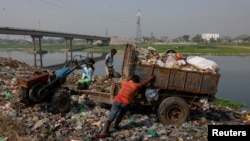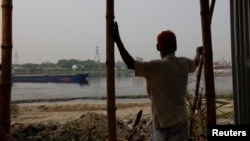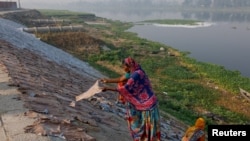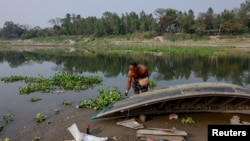Two decades ago Nurul Islam, 70, earned his living by fishing in the Buriganga River that flows southwest of the Bangladesh capital of Dhaka and was once its lifeline.
With hardly any fish to be found in the now dead river, thanks to pollution from widespread dumping of industrial and human waste, Islam sells street food on a small cart nearby to make ends meet.
"Twenty years ago, this river water was good. It was full of life," said Islam, whose family has been living on the bank of the river for generations.
"We used to bathe in the river. There were lots of fish … many of us used to earn a living by catching fish in the river. Now the scenario has changed."
Shallow and smelly
The Buriganga, or Old Ganges, is so polluted that its water appears pitch black, except during the monsoon months, and emits a foul stench throughout the year.
The South Asian nation of nearly 170 million, with about 23 million living in Dhaka, has about 220 small and large rivers, and a large chunk of its population depends on rivers for a living and transport.
Bangladesh is the world's second-biggest garment exporter after China, but citizens and environment activists say the booming industry is also a major contributor to the ecological decline of the river.
Untreated sewage, byproducts of fabric dyeing and other chemical waste from nearby mills and factories flow in daily. Polythene and plastic waste piled on the riverbed have made it shallow and caused a shift in course.
"Those who bathe in this river often suffer from scabies on their skin," said Siddique Hawlader, 45, a ferryman who lives on his boat on the river. "Sometimes our eyes itch and burn."
Too few to enforce rules constantly
In 1995 Bangladesh made it compulsory for all industrial units to use effluent treatment plants to keep pollution out of its rivers, but industries often flout the rule.
While the government makes regular checks to ensure the rules are being followed, it lacks the staff for round-the-clock monitoring, said environment official Mohammad Masud Hasan Patwari.
The Bangladesh Garment Manufacturers and Exporters Association said all textile factories had effluent treatment plants for wastewater.
"This is mandatory and there is no way to skip the rules as they must ensure compliance with international standards," said Shahidullah Azim, one of its officials.
Pollution in the river water during the dry season was well above standard levels, a recent survey by the River and Delta Research Center showed, identifying industrial sewage as the main culprit.
"The once-fresh and mighty river Buriganga is now on the verge of dying because of the rampant dumping of industrial and human waste," said Sharif Jamil of environment group the Bangladesh Paribesh Andolon.
"There is no fish or aquatic life in this river during the dry season. We call it biologically dead."








